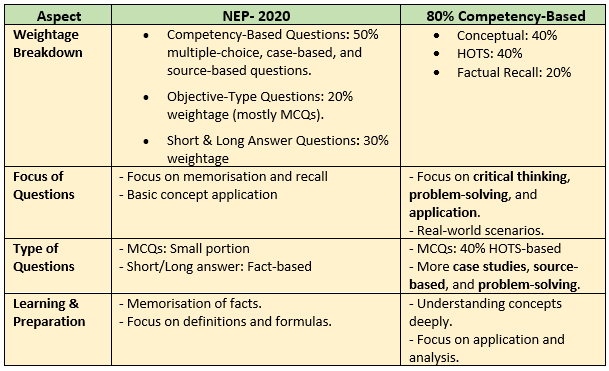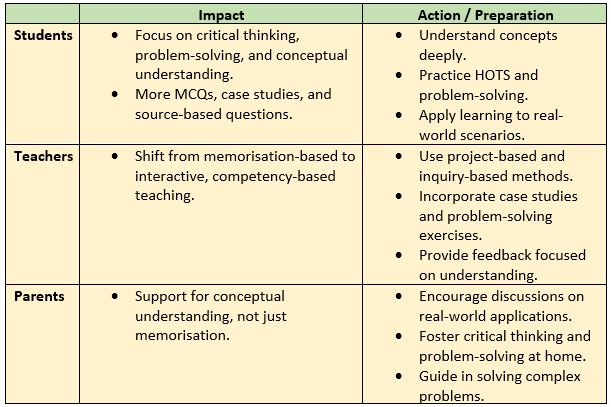The Central Board of Secondary Education (CBSE) is revamping its approach to student evaluation. Starting this academic year, Class 10 board exams might undergo significant changes. As part of the NEP 2020 framework, the aim is to shift 80% of the exam focus towards competency-based learning instead of rote memorisation. Under this new structure, 40% of the marks will come from Higher Order Thinking Skills (HOTS) multiple-choice questions, while another 40% will assess a student’s conceptual understanding. Only 20% will be dedicated to factual recall.
In this blog, we will explore how this shift will change the exam pattern and what students, teachers, and parents can expect as they transition from the current format to an 80% Competency-Based Learning model.
What Is Competency-Based Learning?
Competency-based learning is all about assessing how well you can apply your knowledge, rather than just recall facts. In this system, students are expected to:
- Analyse complex problems,
- Reason through different solutions,
- Apply concepts to real-life situations.
This approach is aligned with the goals of NEP 2020, which aims to foster critical thinking and problem-solving among students. It’s less about memorisation and more about what you can actually do with the knowledge you’ve gained.
Why Rote Learning Might Not Work Anymore
If the new system comes into effect, rote learning will no longer be enough. Students who focus only on memorising textbooks may find it difficult to tackle the more application-based questions that could dominate the exams.
- Analytical skills, critical thinking, and the ability to apply knowledge will be essential to scoring well.
- Problem-solving abilities will be tested in real-world scenarios is a major departure from the traditional model that valued memorisation over understanding.
Know in detail – Decoding the New CBSE 2026 Exam Pattern (50% competency, 20% MCQ, 30% descriptive)
The Benefits of Competency-Based Learning
Students will benefit from a system that prepares them for the real world rather than just exams:
- Develop critical thinking and problem-solving skills.
- Gain skills in applying knowledge to complex, real-life situations.
- Reduced stress around rote memorisation and better preparation for higher studies or careers.
For teachers, the focus on application and understanding will lead to more engaged students, fostering a more dynamic learning environment. Parents will also benefit from supporting a learning system that emphasises understanding and practical skills, reducing the pressure of exam cramming.
CBSE Class 10 Exams: NEP 2020 vs 80% Competency-Based for class X

New 80% CBE for class X: What It Means for Students, Teachers, and Parents!

Final Thoughts
While there are indications that CBSE might shift to 80 % competency-based exam model, it is not official yet. For now, students, teachers, and parents should stay informed and be prepared for the possible changes in the coming year.
The proposed 80% competency-based approach could transform the way students are assessed in Class 10. It will require a shift away from memorisation and toward real-world applications, problem-solving, and higher-order thinking.
Be prepared to think critically, apply concepts, and solve problems; memorisation may soon be a thing of the past!





























